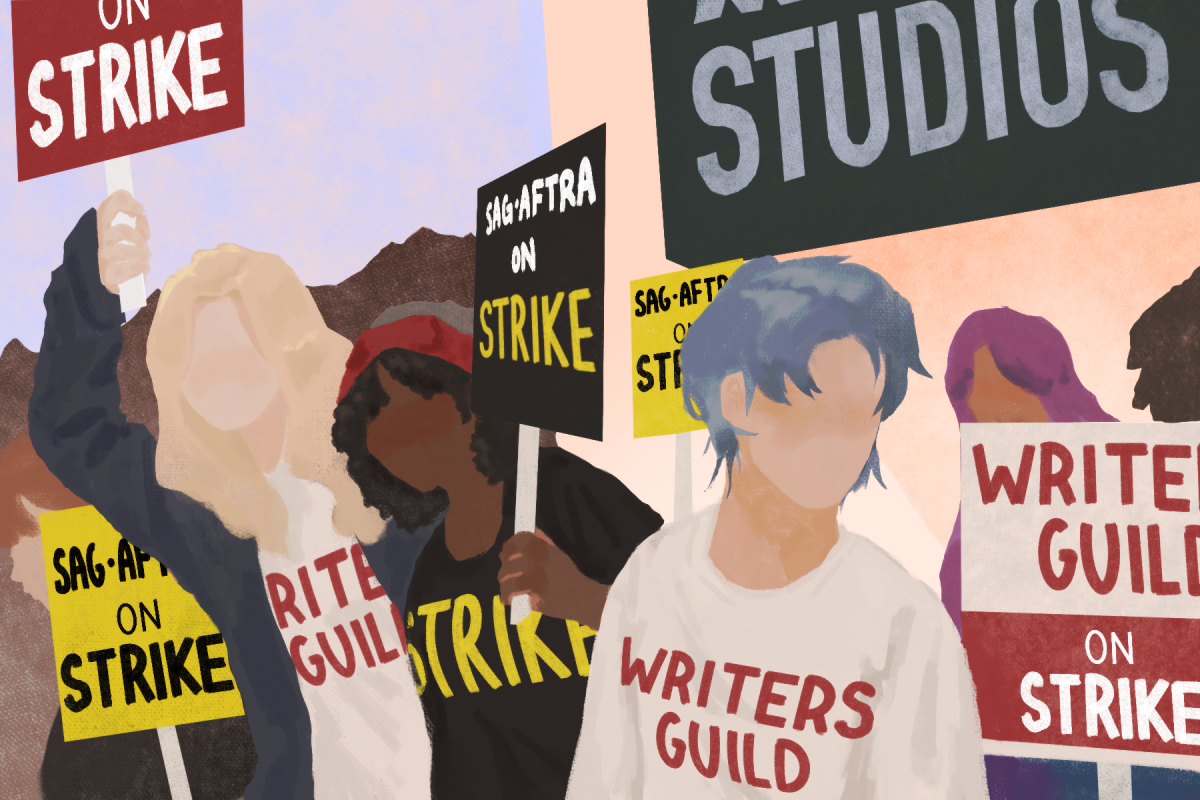Advancements in AI and the lack of increased pay caused actors and writers to strike together for nearly five months, leading to a writer’s victory and a waiting game for actors. It’s time for movie studios and streaming services to be fair with entertainers to avoid another standstill.
As the clock reached 12:01 a.m. on Wednesday, the efforts of writers prevailed in a new 3-year contract taking back control from AI and higher pay. Yet, as writers return to illustrate stories, there are no actors to perform these tales, leaving the dire need for Hollywood executives to get out of their pride and continue the streak of negotiation with actors.
When writers, represented by the Writers Guild of America (WGA), walked out on May 2 and actors, represented by SAG-AFTRA, on July 14, the united front by both unions demonstrated their goal to get top executives of major film studios to finally address their ignored demands. Yet, big-name studios only waited, creating a toll of consequences that were hard-hitting, especially for freshman Lucas O’Donnell, whose father is a producer.
“It’s been nine months (since my dad has been) without a job,” O’Donnell said. “(Though) the writers’ strike started on (May 2), everyone knew it was (going to) happen before then, so they did not start new projects.”
Fortunately, the agreement made between writers and film studios that included Netflix, Disney, Warner Bros. Discovery, Apple and NBC Universal, was announced on Sept. 24, ending the WGA strike on Sept. 27. However, disastrous consequences on anticipated entertainment projects and accounts of unemployment similar to that of O’Donnell’s father leave disruptions in the entertainment industry that were clearly the faults of top Hollywood executives. Now with vacant performers to fill in resuming productions, these consequences must make movie studios act faster to the negotiation table.
Initially, instead of cooperating with the needs of both unions, film studios such as Disney, Warner Bros. Discovery and Netflix announced production delays of anticipated films and television shows such as “Spider-Man: Beyond the Spider-Verse,” the upcoming third film in the critically acclaimed film series that made $689 million globally. Additionally, the third season of the popular Max series “Euphoria” and the renewal of Netflix’s “Emily in Paris” have been hit with postponed release dates, pushing as far back as 2025 for “Euphoria.” This sets up a major setback as these popular series have hopes for their stories to continue.
These careless decisions from Hollywood executives of halting and pushing back popular television series and movies have generated a job loss of 17,000 in film, television and music, as reported by CNBC and according to the U.S. Bureau of Labor and Statistics.
To prevent more losses in a damaged industry, movie studios must be as open to actors as they were to writers. For nearly two months on strike, actors must now push for greater demands than writers to send a message that entertainers are not budging when it comes to fair compensation as they struggle to make it through.
In July, top executives such as Disney CEO Bob Iger regarded the demands of writers and actors as “not realistic” and “disruptive” amid the company’s attempts to heal from their losses during the COVID-19 pandemic. Yet, their profits have fallen further as Warner Bros. Discovery’s CEO David Zaslav anticipated when he predicted that the company would lose $300 million to $500 million in earnings. The strikes hit CEOs when their pockets started to run dry, only showing that it was their greed that caused them to finally meet striking entertainers.
These monumental impacts from the negligence of big-name film studios and CEOs resulted in procrastinated talks. As writers rejoice at a deal from five days of back-and-forth meetings, the same hope lies with actors. The movement of picketing background actors, stuntmen, and screenwriters has shown that top Hollywood executives have finally listened as their profits begin to dwindle.
Hopefully, the future of new creative visions through acting and screenwriting can be preserved with actors and writers first. The time has come for film studios and streaming services to acknowledge the very workers who contribute to a multi-billion dollar industry that entertains the world to prevent further impactful damage in Hollywood.
















